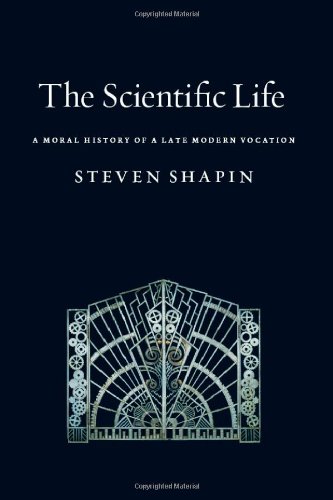

Most ebook files are in PDF format, so you can easily read them using various software such as Foxit Reader or directly on the Google Chrome browser.
Some ebook files are released by publishers in other formats such as .awz, .mobi, .epub, .fb2, etc. You may need to install specific software to read these formats on mobile/PC, such as Calibre.
Please read the tutorial at this link. https://ebooknice.com/page/post?id=faq
We offer FREE conversion to the popular formats you request; however, this may take some time. Therefore, right after payment, please email us, and we will try to provide the service as quickly as possible.
For some exceptional file formats or broken links (if any), please refrain from opening any disputes. Instead, email us first, and we will try to assist within a maximum of 6 hours.
EbookNice Team

Status:
Available4.4
6 reviews

ISBN 10: 0226750248
ISBN 13: 9780226750248
Author: Steven Shapin
Who are scientists? What kind of people are they? What capacities and virtues are thought to stand behind their considerable authority? They are experts—indeed, highly respected experts—authorized to describe and interpret the natural world and widely trusted to help transform knowledge into power and profit. But are they morally different from other people? The Scientific Life is historian Steven Shapin’s story about who scientists are, who we think they are, and why our sensibilities about such things matter.
Conventional wisdom has long held that scientists are neither better nor worse than anyone else, that personal virtue does not necessarily accompany technical expertise, and that scientific practice is profoundly impersonal. Shapin, however, here shows how the uncertainties attending scientific research make the virtues of individual researchers intrinsic to scientific work. From the early twentieth-century origins of corporate research laboratories to the high-flying scientific entrepreneurship of the present, Shapin argues that the radical uncertainties of much contemporary science have made personal virtues more central to its practice than ever before, and he also reveals how radically novel aspects of late modern science have unexpectedly deep historical roots. His elegantly conceived history of the scientific career and character ultimately encourages us to reconsider the very nature of the technical and moral worlds in which we now live.
Building on the insights of Shapin’s last three influential books, featuring an utterly fascinating cast of characters, and brimming with bold and original claims, The Scientific Life is essential reading for anyone wanting to reflect on late modern American culture and how it has been shaped.
List of Illustrations
Acknowledgments
Preface
1 Knowledge and Virtue
The Way We Live Now
2 From Calling to Job
Nature, Truth, Method, and Vocation from the Seventeenth to the Nineteenth Centuries
3 The Moral Equivalence of the Scientist
A History of the Very Idea
4 Who Is the Industrial Scientist?
The View from the Tower
5 Who Is the Industrial Scientist?
The View from the Managers
6 The Scientist and the Civic Virtues
The Moral Life of Organized Science
7 The Scientific Entrepreneur
Money, Motives, and the Place of Virtue
8 Visions of the Future
Uncertainty and Virtue in the World of High-Tech and Venture Capital
The Way We Live Now
Epilogue
Notes
Bibliography
Index
the scientific life a moral history
what is life history theory
what is a morality myth
the science of morality
the moral life of henrietta lacks
Tags: Steven Shapin, Scientific Life, Moral History, Late Modern, Vocation